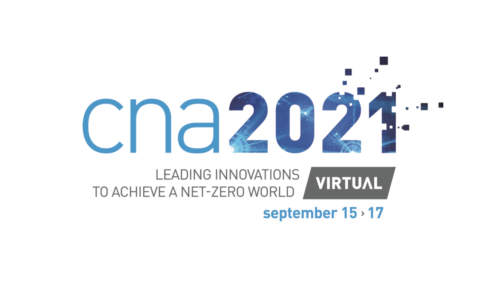
Nuclear Features Prominently at 2014 Canadian Energy Summit
June 26, 2014
By John Stewart
Director, Policy and Research
Canadian Nuclear Association
Nuclear topics were featured at the Energy Council of Canada’s 2014 Canadian Energy Summit thanks in large part to hard work by the CNA. The one-day event in Calgary brought together various Canadian energy sectors, federal and provincial figures, plus U.S. and Mexican reps. The following are a few highlights.

CNA President John Barrett and MP Kelly Block at the 2014 Canadian Energy Summit
- Social license for big energy projects was a central topic. CNA President John Barrett argued that, given differing resource endowments and energy production in provincial jurisdiction, a sense of national urgency or need may be the prerequisite for a national energy strategy. Since there is no perceived lack of energy, fashioning a national strategy may be difficult. However, a shared concern through the energy sector over climate change might provide this uniting factor. The Canadian Gas Association’s Tim Egan said big projects need a crucial combination of policy prioritization, creativity, and profit opportunity.
- Among big energy projects, top of mind was LNG exports through the British Columbia coast. Participants noted the shrinkage of Canada’s gas exports to the U.S. market (on both volume and price) since the shale gas revolution and the economic stakes for Canada in reaching new markets within the next five to six years.
- Another key topic was Canada’s national energy strategy. Egan noted that given disparate provincial interests, the most realistic aim could be to secure agreement on shared principles and values.
- Pollster Greg Lyle (currently working with the CNA on our annual national survey) presented research on project opponents (NIMBYs). Lyle continued to stress that ultimately, those with NIMBY attitudes to infrastructure are relatively few in number. He emphasized approaches that reach a larger and more persuadable group: those who “don’t like a project but think it’s necessary.”
- On nuclear, lawyer David McFadden recalled the creation of Bruce Power, saying that while this decision directly contradicted the Macdonald Royal Commission’s advice not to privatize nuclear plants, the decision was supported by “good communications and a comprehensive view of the region’s economic and social development,” and this proved highly successful.
- McFadden and Hydro One’s Mike Penstone also recalled the success of the methods used to obtain social license from both natives and wealthy property owners along the closely related Bruce-Milton power transmission corridor – another process that McFadden concluded “could have been a mess but instead went beautifully.”
- Peter Lang of Dunedin Energy gave a brief but effective presentation on Canadian applications for small reactors. Asked later about “game changing innovations,” Lang cited Liquid Fluoride Thorium Reactors (LFTRs) for their capacity to address most or all of the reservations most of the public has about nuclear power generation.

